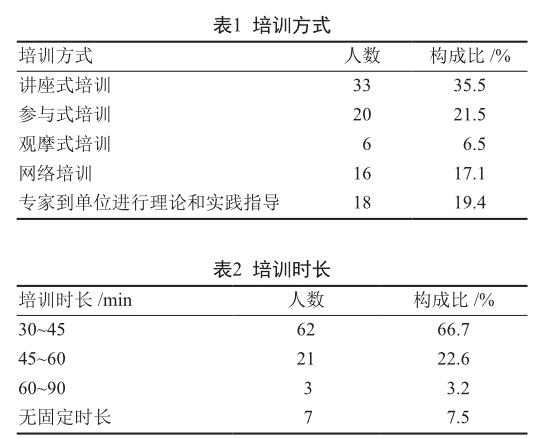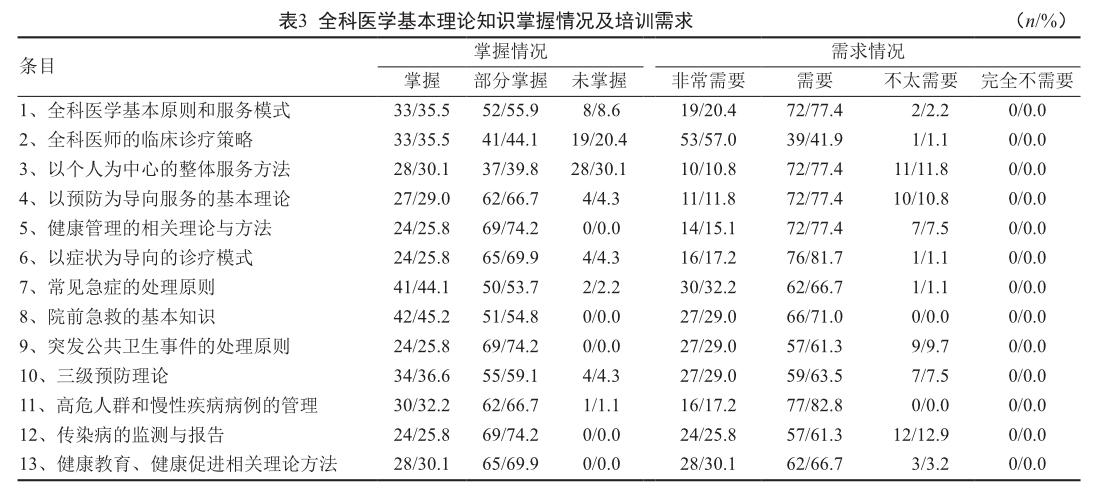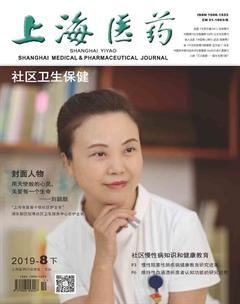松江区全科医师知识技能掌握及培训需求调查分析
黄慧 褚天运 朱玉龙



摘 要 目的:了解松江區全科医师相关知识技能的掌握情况及培训需求,为卫生行政部门和社区卫生服务中心有针对性的进行全科医学培训提供建议。方法:采取分层抽样方法选取九亭镇、新桥镇、洞泾镇、小昆山镇、石湖荡镇及泖港镇等6家社区卫生服务中心的170名全科医师为调查对象进行问卷调查。调查内容包括全科医师的基本情况、培训动机、培训方式及时长、全科医师对相关专业知识的熟悉程度及培训需求。结果:①100.0%的全科医师认为非常需要或需要掌握院前急救的基本知识及高危人群和慢性疾病病例管理的相关知识。②100.0%的全科医师认为非常需要和需要掌握全科6大系统的相关知识;7.5%的全科医师认为完全不需要掌握与妇女、儿童保健相关的知识和技术;1.1%的全科医师认为完全不需要掌握常规药物使用的相关知识。③全科医师中医药服务相关知识的掌握及部分掌握比例之和仅为59.1%;2.2%的全科医师认为不需要掌握处理伦理和社会问题技巧的相关知识。④全科医师常用化验检查及结果解读相关知识未掌握比例高达20.4%;全科医师认为完全不需要掌握传染病的预防和检测及社区常用康复技术的相关知识,占比分别为3.2%、2.2%。结论:建议卫生行政部门完善全科医师培训考核体系,全力推进全科医师培训工作。同时及时发现培训中存在的薄弱环节和亟待解决的问题,提出整改措施,提升全科医师的培训效果。
关键词 全科医师;知识技能;培训需求
中图分类号:R197.1 文献标志码:A 文章编号:1006-1533(2019)16-0013-05
Investigation and analysis of the mastery of knowledge and skills and training needs of general practitioners in Songjiang District
HUANG Hui, CHU Tianyun, ZHU Yulong
(General Practice Department of Xiaokunshan Community Health Service Center of Songjiang District, Shanghai 201616, China)
ABSTRACT Objective: To understand the mastery of knowledge and skills and training needs of general practitioners in Songjiang District for providing advice for the health administrative department and community health service center to conduct targeted general medical training. Methods: A stratified sampling method was used to select 170 general practitioners from six community health service centers, including Jiuting Town, Xinqiao Town, Dongjing Town, Xiaokunshan Town, Shihudang Town and Maogang Town to conduct a questionnaire survey. The survey contents included the basic situation of the general practitioner, the motivation of the training, the training method and time, the familiarity with relevant professional knowledge and the training needs of the general practitioner. Results: (1)100.0% of general practitioners thought that it was very necessary or necessary to have a basic knowledge of pre-hospital first aid and knowledge about high-risk populations and chronic disease case management.(2)100.0% of general practitioners thought that it was very necessary and necessary to master the relevant knowledge of the six major systems of general medicine; 7.5% of general practitioners thought that there was no need to master the knowledge and skills related to womens and childrens health; 1.1% of general practitioners thought that they did not need to master the knowledge of routine drug use at all. (3) The sum of mastery and partial mastery proportions of TCM service knowledge of general practitioners was only 59.1%; 2.2% of general practitioners thought that there was no need to master the relevant knowledge to deal with ethical and social problem skills. (4) The proportion of general practitioners who had not mastered the knowledge of laboratory tests and interpretation of results was as high as 20.4%; the general practitioner thought that there was no need to master the prevention and detection of infectious diseases and the knowledge of common rehabilitation techniques in the community, accounting for 3.2% and 2.2%, respectively. Conclusion: It is suggested that the health administrative department should perfect the system of training and assessment of general practitioners and make full efforts to promote the training of general practitioners. At the same time, the existing weak links and urgent problems in the training should be found out in time, and corrective measures should be put forward to improve the training effect of general practitioners.

据杨慧敏等[6]的调查显示,高学历、高职称的医疗工作者在社区卫生服务中心从事全科医学工作的比例较低。因此,要提升社区卫生服务中心全科医师的总体素养和业务水平,必须先综合提升其社会地位和经济收入,吸引更多的高素质医务工作者从事全科医学工作。同时从制度层面加强宣传,让社会、政府更多的了解全科医师的工作内容,不断稳定全科医师队伍,把全科医学真正落到实处,惠及社区居民。
93名全科医师的培训动机均为工作需要或自我提升,其中52名(55.9%)的培训动机为工作需要,其余41名(44.1%)为自我提升,说明全科医师都具有强烈的培训学习需求。多数全科医师选择的培训形式为讲座式培训(35.5%),这可能与医师习惯于讲座式授课方式有关。培训时长上多数(66.7%)全科医师选择了30~45 min,也提示培训组织者应尽量控制授课时长。
全科医师对常见急症的处理原则及院前急救的基本知识掌握情况均较好,完全掌握的人数均超过了40.0%;100.0%的全科医师认为非常需要或需要掌握院前急救的基本知识及高危人群和慢性疾病病例管理的相关知识;未掌握的主要是以个人为中心的整体服务方法和全科医师的临床诊疗策略,说明全科医师的整体观念不强,可能仍然存在以专科观念看待全科专业的情况。100.0%的全科醫师认为非常需要和需要掌握全科6大系统的相关知识;中医药服务的掌握及部分掌握比例之和仅为59.1%,说明全科医师对中医药知识的掌握较为薄弱,这可能与社区卫生服务中心普遍设有中医科、有专职中医医师有关。全科医师未掌握比例较高的几个条目为常用化验检查及结果解读,X线、心电图的图像识别及社区常用康复技术,其中常用化验检查及结果解读的未掌握比例高达20.4%。提示我们今后培训中应多增加这些方面的内容,以弥补不足。
从全科医师对相关专业知识的熟悉程度看,应强化公共卫生知识的相关培训,着重考虑全科医师的实际需求,达到“熟临床、懂公卫、具人文、会管理”的培养目标,进一步完善和优化培训项目。实施培训的过程当中,还可以开展人际沟通等公共关系学的培训,全面提升全科医师的预防医学知识和人文素养。
综上所述,松江区全科医师接受培训的意愿比较强烈,建议卫生行政部门完善全科医师培训考核体系,推出有益的新举措,加大经费投入,提升培训的数量及质量,全力推进全科医师的培训工作[7]。同时应及时发现培训中存在的薄弱环节和亟待解决的问题,提升全科医师的培训效果。本次研究样本量有限,因此存在一定的选择偏倚,自行设计的问卷也可能会导致重要信息的遗漏,以上情况有待进一步研究完善。
参考文献
[1] 秦怀金. 关于我国社区卫生服务发展与改革的思考[J]. 中国卫生政策研究, 2012, 5(3): 1-3.
[2] 杨秉辉, 祝墡珠. 全科医学概论[M]. 3版. 北京: 人民卫生出版社, 2008: 9-10.
[3] 刘堃, 张滨, 唐贵忠. 重庆市贫困地区乡镇全科医师培训状况调查[J]. 现代预防医学, 2009, 36(16): 3059-3061.
[4] 祝墡珠. 关于全科医师制度建立的问题及建议[J]. 中华全科医师杂志, 2011, 10(10): 703-704.
[5] 顾杰, 江孙芳, 祝墡珠, 等. 上海市全科医师培训需求调查和相关因素分析[J]. 中华全科医师杂志, 2012, 11(8): 575-578.
[6] 杨慧敏, 尹德卢, 辛倩倩, 等. 我国基层全科医生队伍现状和继续医学教育内容需求分析[J]. 中华全科医学, 2018, 16(10): 1591-1594.
[7] 方吕, 张勘. 上海市全科医师规范化培训的进展与挑战[J]. 上海医药, 2012, 33(20): 17-22.

